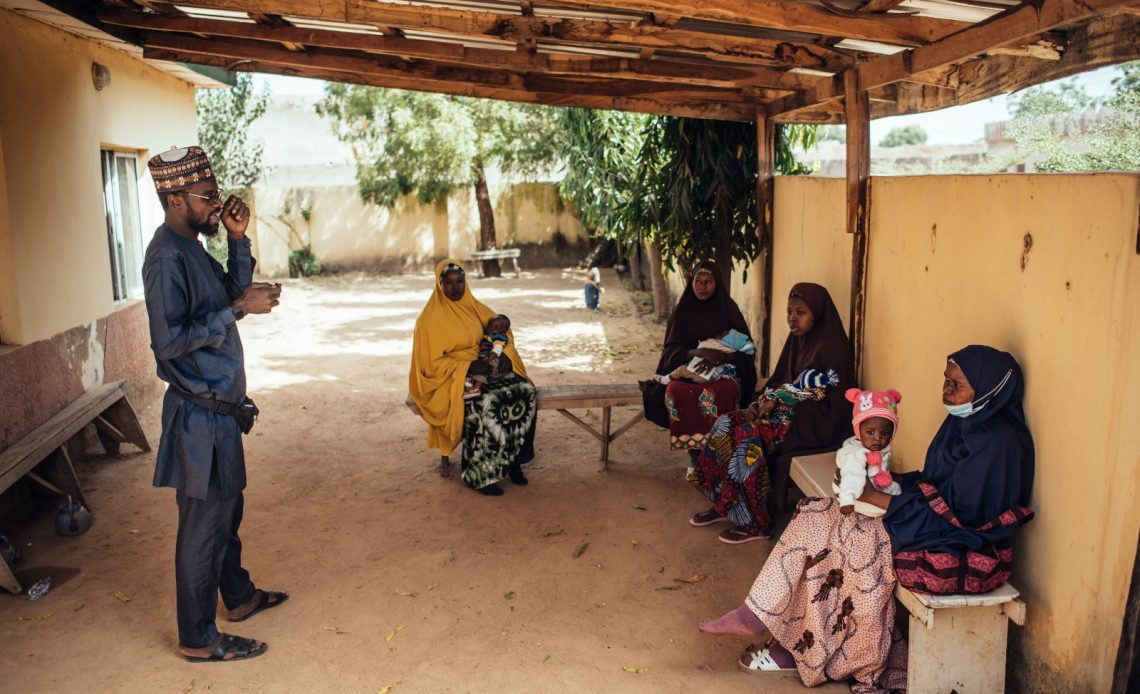In Dawanau Primary Healthcare Centre (PHC) located in Dawakin Tofa Local Government Area (LGA) of Kano State, Zainab Aliyu cradles her seven-month-old daughter, Fatima Abdulhamid. They sit on a bench with ten other women and their children, waiting for immunisation services. Rahama Bashir, a New Incentives field officer, leads Aliyu to a table where Asmau Tahir, the facility’s routine immunisation (RI) officer, carefully examines Fatima’s vaccination card. After verifying its authenticity, he administers a vaccine to Fatima and then points her to an adjacent table where the field officer Saminu Salisu disburses the cash.
“It is our second visit,” says Aliyu, expressing gratitude as Bashir provides her with N500, a token provided to assist caregivers with transportation costs when bringing their children for immunisation. “A few weeks ago, she was running a temperature, so I brought her here. She was treated and then given a vaccination. I was then given N500 for my transport,” Aliyu happily recounts. Fatima, who was born at home and missed out on vaccination, was able to receive both treatment and vaccination at Dawanau PHC when she fell ill at five months old. After being impressed by Fatima’s improved health, Aliyu brought her back for her next vaccination. With the assurance of receiving transport support, she “borrowed money from a neighbour” to pay for a ride on a popular tricycle known as “Daidaita Sahu” to get to the facility.
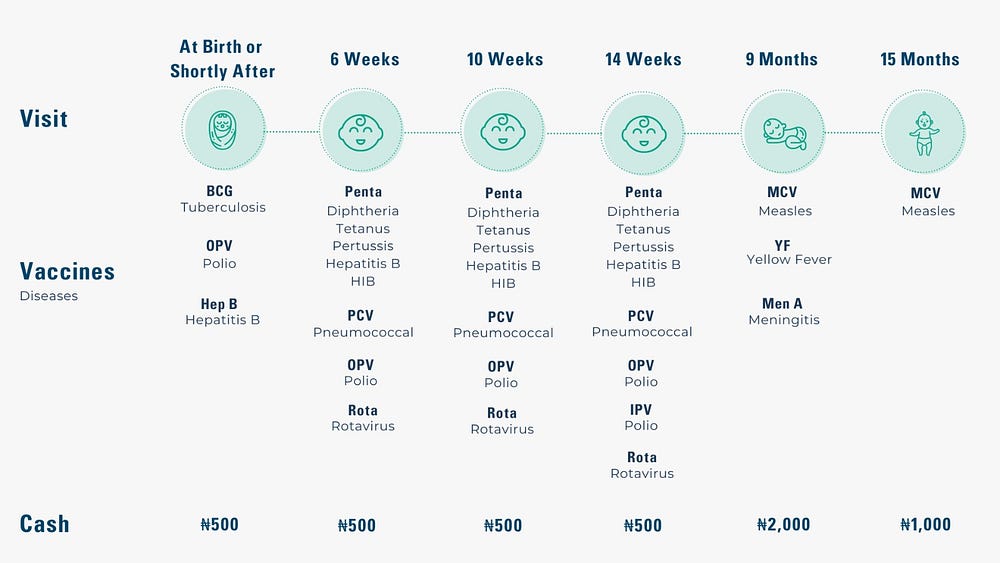
Boosting vaccination demand through cash incentives
New Incentives — All Babies Are Equal (NI-ABAE) is a non-governmental organisation working in partnership with State Ministries of Health (SMOHs) and State Primary Health Care Development Agencies (SPHCDAs) through State Emergency Routine Immunisation Coordination Centres (SERICCs) to improve the demand for routine immunisation for children in northern Nigeria. The All-Babies programme provides cash incentives totalling N5,000 over the course of six visits to caregivers who bring their children for routine vaccination against childhood killer diseases.
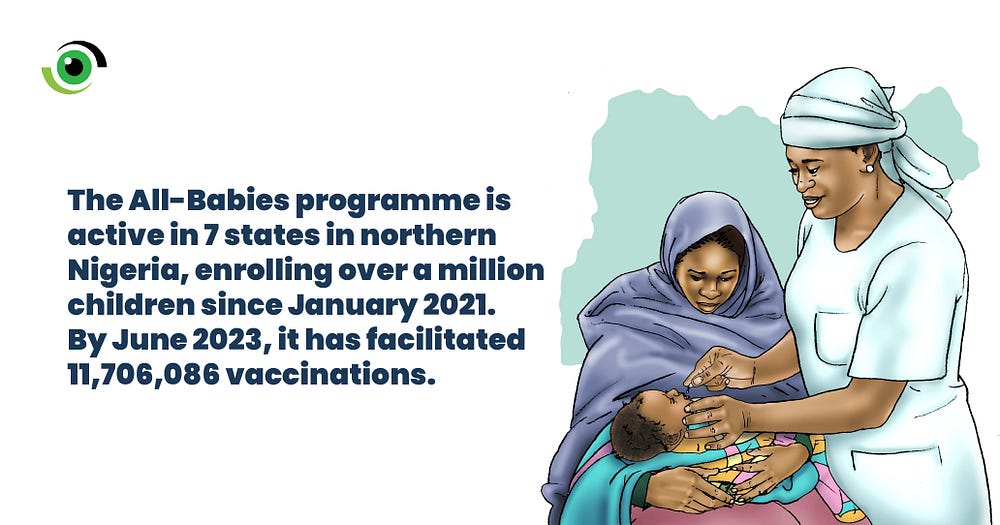
Since its inception in 2017 in Katsina, Zamfara, and Jigawa States, the All-Babies programme has expanded its reach to four additional states in Nigeria. Over a million children have been enrolled and encouraged to receive more than 11 million vaccines through cash incentives since the programme began to scale in January 2021.
NI-ABAE started operations in Kano State in January 2023, and Dawanau PHC is one of the 431 primary healthcare facilities in 16 LGAs where the programme is being implemented. According to Tahir, since the initiation of the programme, the increase in vaccination attendance by caregivers and their children has been remarkable. “Because this is a low-income area, transportation cost is a hindrance to accessing health services, including vaccination,” she says, adding that since March 2023, the facility has been overshooting its weekly vaccination targets.
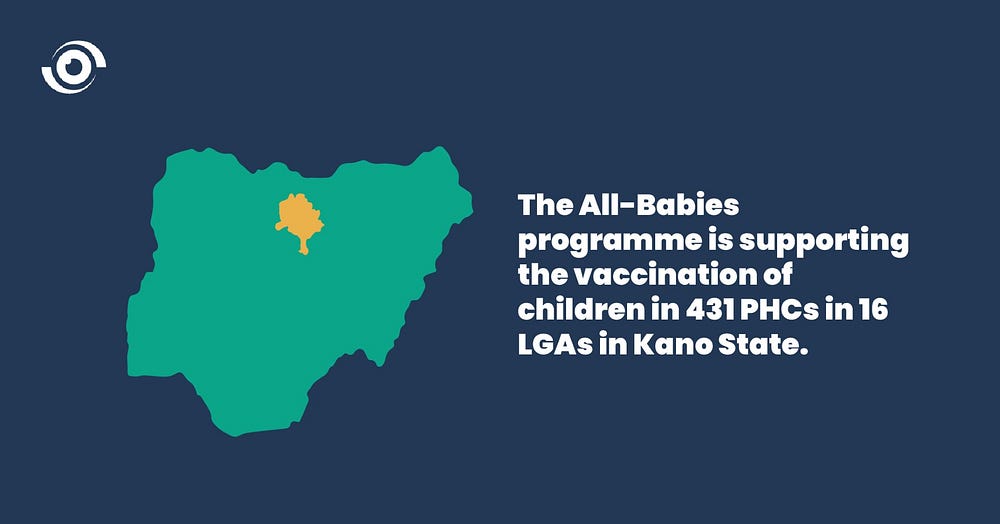
More than just transport
‘’I saved part of the last N500 I was given. I will save part of this too,’’ says Sa’adatu Yunusa after receiving N500. This was her second visit, and her daughter, two-month-old Aisha Shamsu, had just received her vaccinations. Yunusa is a housewife and plans to use part of the money she will be receiving throughout Aisha’s immunisation cycle to start a business. She lives close to Dawanau PHC and spends less than one hundred naira on transportation. Samira Abdullahi is on her fourth visit with her daughter, 12-month-old Fatima Kabiru. Like Yunusa, Abdullahi also lives close to Dawanau PHC and therefore uses part of her incentive to buy some food condiments for her family.
Field officers improving vaccination demand
“Their work goes beyond distributing money,” says the RI officer, Tahir, referring to how the NI-ABAE field officers have improved overall immunisation delivery in the facility. “On immunisation day, they help us with arranging the women and their children, sort the cards, ensure they wash their hands at our handwashing station before coming to the facility and assist with crowd control,” she adds.
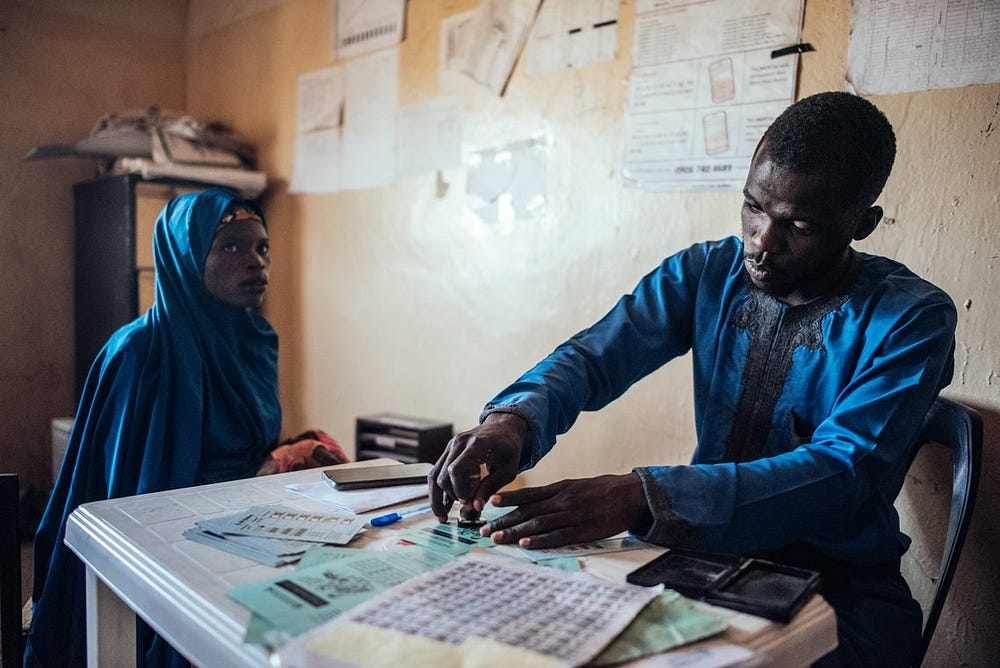
Bashir and Salisu are well known in the community, and their presence in the Dawanau area fosters trust among community members regarding vaccination. Like many states in northern Nigeria, Kano has faced historical challenges of vaccine mistrust, especially towards the polio vaccine, leading to many children being denied vaccination by their caregiver, contributing to Nigeria having a high rate of under-five mortality and battling with the devastating effects of wild polio. To address these issues, initiatives utilising community members as immunisation champions have been implemented by governments and partners. All-Babies programme is leveraging this approach to sustain and enhance acceptance within the community.
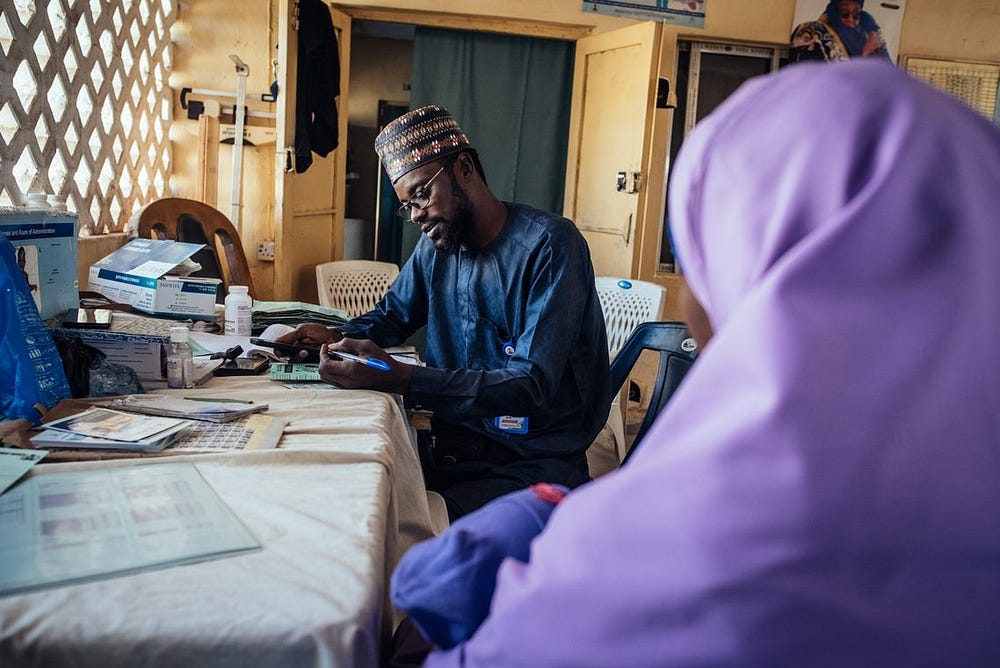
According to Tahir, Dawanau PHC also conducts regular vaccination outreaches to communities within its catchment areas. On these occasions, NI-ABAE field officers assist in dispelling misconceptions surrounding vaccines while continuing to provide cash incentives to caregivers who bring their children for vaccination. “The field officers take time to talk about the benefits of vaccinating children during outreaches. In fact, merely seeing them with us boosts the confidence of community members in vaccination,” she reveals.
Stakeholder meeting to review progress and challenges
NI-ABAE brings together participating states to share learnings and experiences and to discuss progress and challenges. Kano State hosted the fifth stakeholders meeting between the 3rd and 4th of May 2023, which brought together policymakers from implementing states and NI-ABAE officials. Each state made a presentation on the number of children enrolled, communities and health facilities reached, cash disbursed, and challenges encountered.
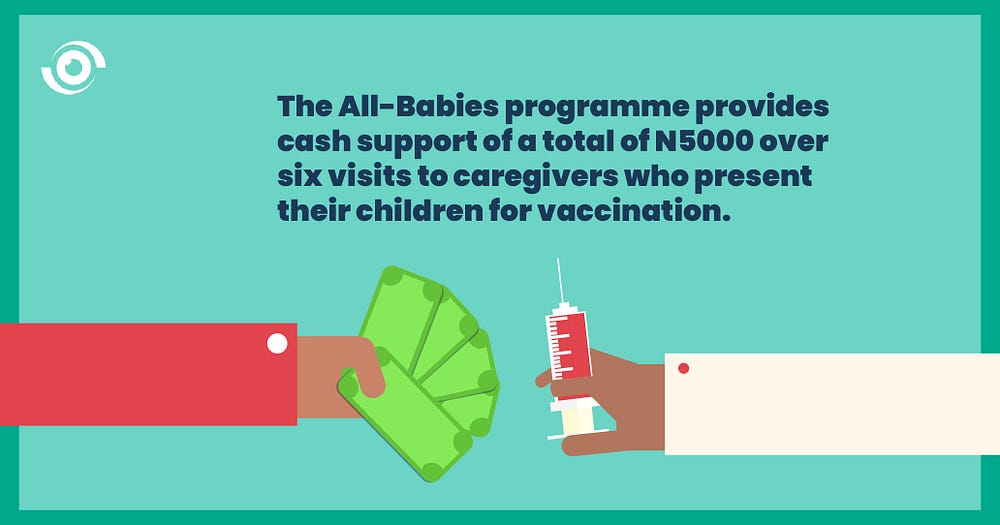
Danladi Adamu, Permanent Secretary, Gombe State Ministry of Health, who chaired the meeting, acknowledged the significant increase in the number of mothers bringing their children for vaccination in Gombe State. “Our biggest challenge before this programme was demand generation. That is no longer the issue,” he said, adding that the state is now experiencing a new challenge of vaccine stockouts in health facilities due to the increased demand. He revealed that the State Ministry of Health is working to resolve this issue. Mubarak Bawa, the Operations Coordinator of NI-ABAE, said the programme will support the states in improving their vaccine distribution systems to ensure that they meet the increased demand.
Targeted advocacy to combat vaccine hesitancy
Despite the efforts of NI-ABAE field officers to combat vaccine misinformation and hesitancy, there is a potential drawback regarding the provision of monetary incentives to caregivers during community vaccination outreaches. This approach could inadvertently foster suspicion and mistrust among caregivers, as the question of why they are being paid to have their children vaccinated may arise. Such doubts and suspicions can undermine the programme’s gains and contribute to medium to long-term vaccine hesitancy within communities.
Additionally, with the rising inflation rate, the value of the N500 incentive may be perceived as insufficient, particularly for community members residing far from health facilities that do not benefit from vaccination outreaches. To address this concern, NI-ABAE should consider adjusting the incentives based on the approximate distance caregivers have to travel to reach the health facilities.
Need for a sustainability plan
Cash transfer programmes often attract community members, but the challenge lies in ensuring long-term sustainability. While NI-ABAE’s strategy of using cash incentives to improve vaccination rates appears to be effective, it raises questions about what will happen when the programme ends. Will the current vaccination rates be sustained, or will there be a decline in uptake?
To sustain the programme’s gains, NI-ABAE and the state governments where the All-Babies programme is being implemented should consider designing a plan to ensure continuity after it ends. Encouraging caregivers to willingly bring their children for vaccination without the promise of cash incentives is critical, as this strategy may become unsustainable in the future. For now, however, the cash incentives are effectively contributing to ensuring that children like Fatima and Aisha are vaccinated and protected from preventable childhood killer diseases.


